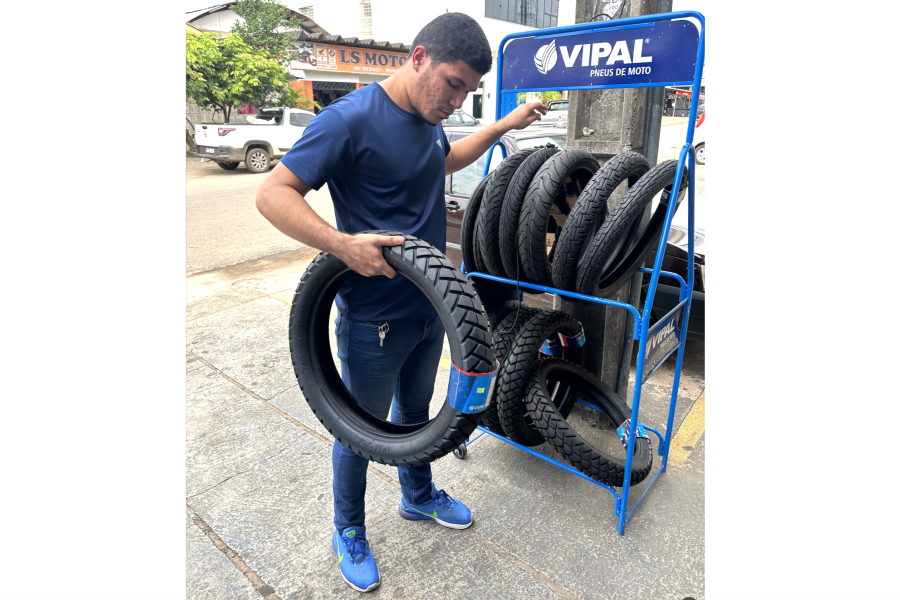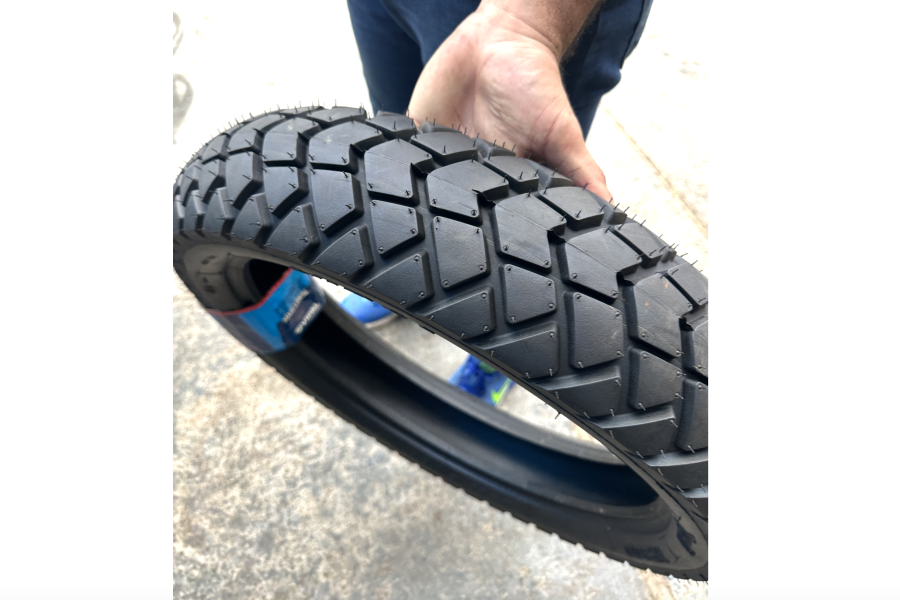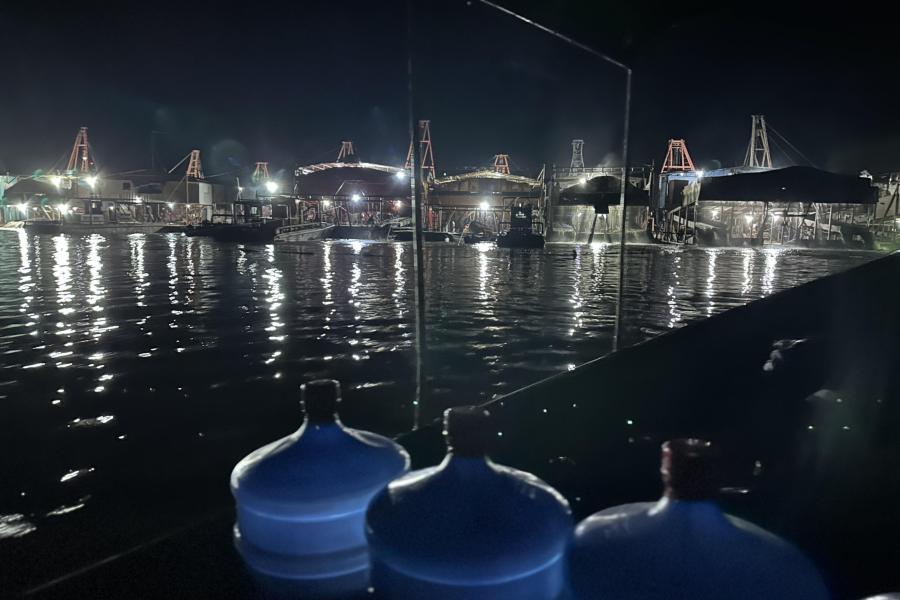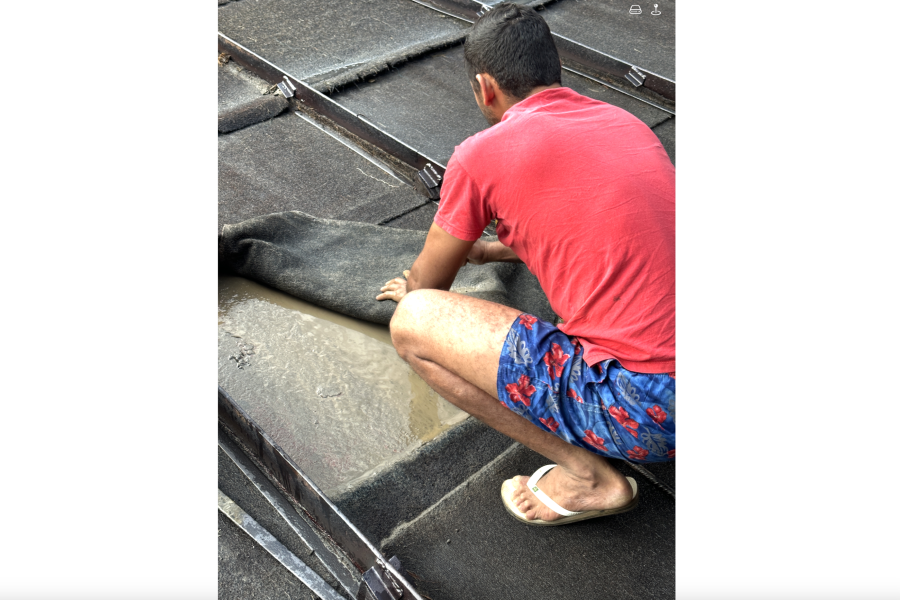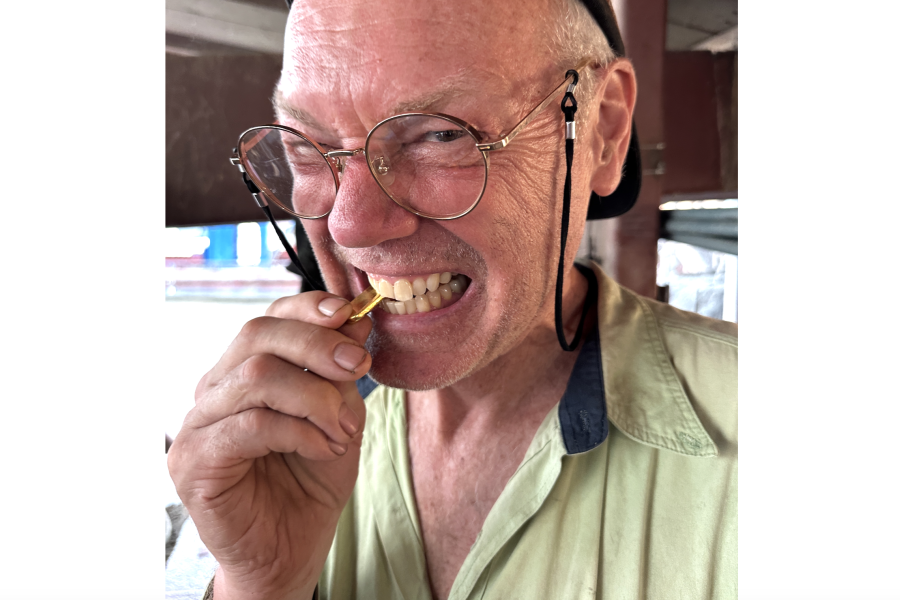Amazon Gold
Country
Late that night I checked into Frank’s recommendation, Hotel Central, Porto Velho. The breakfast buffet was typical Brazilian fare. Much later, I learned these white crepes are made from tapioca flour and are not eaten plain. Take your pick of sweet and savory fillings, such as cheese, banana, coconut, or chocolate. Hmm, that is why the crepes were so boring to me, no filling!
The day in Porto Velho was spent shopping for a handlebar mounting cell phone holder and a new back tire. Soon I would be riding BR-319, the notoriously muddy Ghost Road, and it would be foolish trying with a worn back tire.
After several failed attempts looking for a handlebar-mounted phone holder at motorcycle shops, I was directed to “China Shopping”, the South American equivalent of a Dollar Store. Truth be told, China Shopping carries a better line of products, right next to typical low-end Chinese import goods. The four-post phone holder didn’t inspire confidence that my phone wouldn’t fly off on a bumpy road. I never used it and gave it away down the road.
A few motorcycle shops later I found a suitably knobby back tire. I wasn’t going to hurt myself trying to find the ultimate off-road tire. I have read a lifetime of posts from riders in search of their must-have tire. Sure there are brands I prefer, but I’m not going to spend a lot of time and energy looking for the ultimate hunk of rubber. Does a tire have suitably big tread for off-road? Does it fit my wheel? Is the price OK? Sold, mount it and I’ll be back after lunch.
Just before it shut down for the day, I found an indoor farmers market and a lunch counter. A classic meal of semi-tough beef and black beans, with a dusting of farofa, the ubiquitous ground cassava flour found on every table in the north of Brazil. Looking around the market, it hit me, there is some aspects of Brazil direct from the late 50s or early 60s. The ladies working the market stalls wore light blue dresses/uniforms and hair nets. Large stainless steel water dispensing tanks, common in the Amazon and throughout Brazil, have the feel they were designed decades ago. I was in a time warp and loved it.
Sketchy phone holder purchased, a new knobby tire bought and mounted, and a typical Brazilian lunch tucked in. I am prepared to head out the next morning road the ride the Ghost Road, BR-319, to Manaus. One last item, liability insurance. I was going to be in Brazil many weeks and I’d feel more comfortable with insurance should something go seriously wrong. It was probably a mistake not getting insurance closer to the border, where insurance agents sell to foreigners as they enter the country. I found an insurance agent near my hotel, here it goes. There was some effort to explain my needs: short-term liability insurance for a foreigner-plated motorcycle. We went back and forth until the three nice and attentive ladies in the insurance office understood my quest. A phone call was placed, perhaps to the head office. After a few minutes, the news was delivered. They couldn’t or wouldn’t sell what I wanted. I’ve gotten this type of policy in many countries, but not today, not at this agency. As the conversation was winding down my cellphone rings. It’s Frank inviting me to “something interesting.” Frank’s English isn’t bad, but I’m not understanding what he is saying. My guess, I’m about to be invited to a party or barbecue. That sounds good, but I’m weighing getting on the road in the morning or potentially hanging out in Porto Velho. For clarity, Frank hands his phone to his son, Frank, Jr., who has a strong command of English. What’s up? Do I want to travel with Frank Sr. to a gold dredging boat? Hmm, let me think about it. One second, two seconds, yes.
It was late afternoon, well beyond checkout, so I was committed to paying for the second night at my hotel. Oh well. Frank was leaving soon, so I packed up as quickly as I could, paid my hotel bill, and headed back to to the suburbs. We stored my bike and I mustered the basics of an overnight bag. Shortly we were headed west with the pickup truck loaded with 5-gallon bottles of water, food, and engine parts. During the ride, Frank came clean, he wasn’t a farmer after all. His job was “administrator” of a gold dredging boat. Every few days Frank would deliver supplies to the crew and return to Porto Velho with gold. In any circumstance, the transport of gold is a sensitive topic, not typically shared with casual strangers, so I understood the subterfuge. Considering the potential risk to Frank and the crew, I am not posting photos with their faces.
We were headed back the way we had come the day before, across the now dry construction zone of mud, to an obscure turnoff leading down 10 kilometers of bad dirt road. The road ended at the Madeira River where we loaded the supplies onto a long shallow hull boat. 45 minutes coursing upriver we arrived at a series of 10 barges lashed together. The barges are independent dredging businesses, each running 24/7. The dredging operations stop only for critical maintenance and to harvest the gold flakes sucked up from the river floor and captured by specialized carpets.
I didn’t ask for a detailed breakdown of the profits and expenses. The following are the basic costs. The owners were on the hook to buy or lease the barge and dredging equipment. Figure in fuel, maintenance, parts, tools, food, and water. It’s hard to make a wild estimate of the total. The barge crew consisted of 5-6 men, 1 woman (the cook), and Frank. They are paid a percentage of the profits, therefore they are highly motivated. Chances are the operators aren’t paying registration fees and taxes to the government. Most gold mining operations in the Amazon are not legal. I didn’t ask. A rough calculation using the price of gold in August 2023, came to an approximate number. The crew was pulling over $2000 USD from the river each day. The spot price has risen about 20% in the following 10 months.
Even though the noise of the dredging pumps wasn’t deafening on the upper deck, it was constant. Earplugs made sleep possible. I was fully expecting to sleep in a hammock, but Frank gave up one of the cabins and a simple bed for his guest. Soon after sunrise the pumps stopped, and the specialized carpets were pulled up and rinsed. The gold particles collected by the carpets were distilled by swirling and transferred back and forth from a pail to a wok-shaped bowl. The guy tasked with the process with a skilled hand. If he screwed up, the day of dredging would be lost. Once the shifting was done, the remains were handed off to another guy who melted down the time flecks of gold with a blow torch. Watching gold be separated from river mud, then melted down to a small bar was off the hook memorable. Good luck finding a commercial tour that delivers this experience!
While the pumps were stopped and carpets washed, one of the pump engines was disassembled and the parts Frank brought were installed. The gold consolidation and pump maintenance took about 2 hours, and the dredging resumed. The message was clear, time is money, and get the pumps running again. After half an hour, the dredging controls operator wasn’t satisfied and the pumps were stopped. Fat rubber tubes were custom cut and reworked to fix a problem; the understanding of the issue I didn’t need to grasp. Frank and I would stay on the boat until operations resumed to capacity. As the sun was setting the water taxi took Frank and me downriver to the spot where his truck was parked. Late that night I checked back into the Hotel Central.
In the goal the following day was to reach Humaitá and at the southern end of the BR-319.

